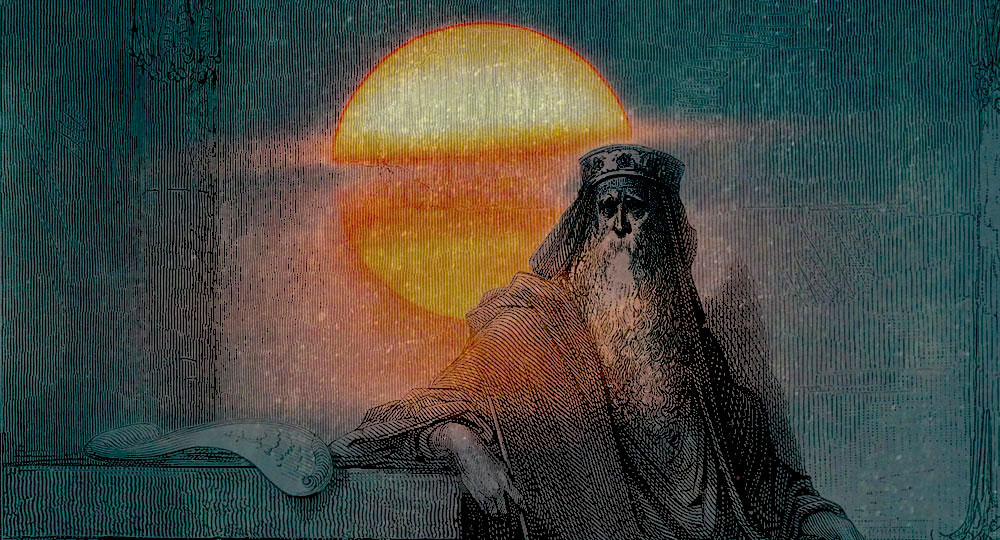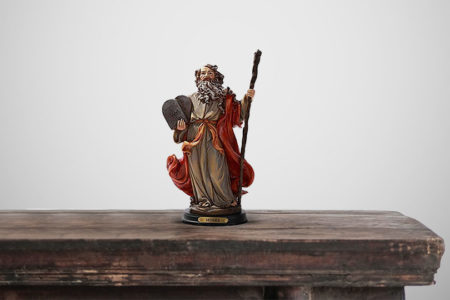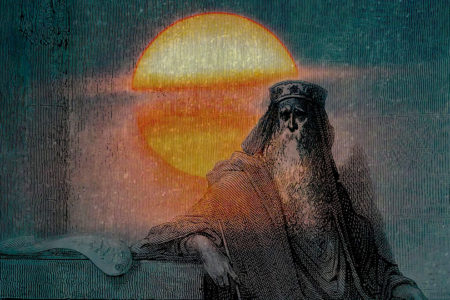Life Under the Sun Eccl. 1-3
A look at how King Solomon tackled life’s conundrums
How do we find meaning in life? That is a question people around the world ask themselves. Even Israel’s King Solomon, the wisest, richest man who ever lived, asked it and gave us his answer in the book of Ecclesiastes.
Solomon, the son of King David and Bathsheba, ascended the throne when his father was 70 years old; and he reigned 40 years (971–931 BC).
One night, God appeared to him at the Tabernacle and asked what He could give the young king. Feeling inadequate to govern (2 Chr. 1:9–10), Solomon requested wisdom and knowledge, which God happily granted, along with “riches and wealth and honor” (v. 12). So Solomon was richer and wiser than all other men and greater than any king on Earth (9:22).
Although Ecclesiastes does not name Solomon as the author, it says, “the words of the Preacher, the son of David, king in Jerusalem” (Eccl. 1:1; cf. v. 12). Some Bible critics have questioned Solomon’s authorship, but little evidence has validated their position. In fact, Israel’s history, along with the knowledge, wisdom, and life experience presented in Ecclesiastes, has led many conservative scholars to believe Solomon wrote the book in the latter years of his life.
Seven times the king identified himself as “the Preacher” (Hebrew, Qohelet), a title that can refer to someone speaking, leading, or teaching in an assembly. The Greek word for “assembly” is ekklesia, which is the book’s title in the Septuagint, the Greek translation of the Hebrew Scriptures. The title in English becomes Ecclesiastes.
Solomon is an interesting but somewhat sad personality because he started out strong with the Lord, then fell into such deep sin it cost the Israelites their united kingdom. For years he loved and served Yahweh; but over time he married 700 wives and amassed 300 concubines who partly turned his heart from the Lord. His wives convinced him to build high places to worship their pagan deities, and idolatry began to flourish in Israel (1 Ki. 11:1–11).
Perspective on Life
Solomon revealed the theme of Ecclesiastes immediately: “‘Vanity of vanities,’ says the Preacher; ‘vanity of vanities, all is vanity.’ What profit has a man from all his labor in which he toils under the sun?” (Eccl. 1:2–3).
The word vanity (used 33 times) means “futility,” “emptiness,” or “vapor.” The idea is that our lives without God are futile. Our labor and toil seem transitory and unsatisfying, leaving us empty and hopeless.
Throughout Ecclesiastes, Solomon played the philosopher, trying to solve life’s problems. First, he tried using empirical knowledge acquired through his five senses. Then he used reason, concluding that ultimate truth regarding life’s paradoxical situations cannot be found through empiricism or well-reasoned philosophies.
Then he sought satisfaction through pleasure, material possessions, riches, accomplishments, philanthropy, and much more. The result? “Vanity of vanities, all is vanity.” In other words, if we center our lives on pleasure, we end up unsatisfied and empty. We will not have profited from anything that brings true meaning or lasting satisfaction despite all our toil under the sun. Our existence will be in vain.
Despite this viewpoint, Solomon was not a total pessimist. He was only pessimistic about life apart from God. In the first three chapters of Ecclesiastes, Solomon surveyed various areas of life to demonstrate his thesis. He expounded on how things continue for centuries with a sameness that achieves nothing new or permanent (v. 4). The sun rises and sets day after day; the wind continuously blows in circuits; rivers run into the sea, but the sea is never full (vv. 5–7). Our lives are “full of labor,” wearisome, monotonous, futile. There is nothing new under the sun that will bring satisfaction (vv. 8–10).
One would suppose that successive generations would learn from the past, but “there is no remembrance of former things” (v. 11). We make the same mistakes over and over and commit the same sins of bygone generations. Solomon himself is a prime example. No one had greater resources than he had to search out the meaning of life. He even said, “And I set my heart to seek and search out by wisdom concerning all that is done under heaven” (v. 13).
Notice, he did not say he sought God for answers; he relied only on his own wisdom. But education and intellectual insight failed to provide the answers Solomon sought, prompting him to conclude that using wisdom and knowledge to find the meaning of life amounted to nothing but “vanity and grasping for the wind” (v. 14): “What is crooked cannot be made straight [wisdom cannot change the course of nature and events], and what is lacking cannot be numbered [wisdom cannot explain all of life’s anomalies]” (v. 15).
Consequently, Solomon grew frustrated because the more he knew, the deeper became his sorrow, grief, and consciousness of his own ignorance. Life became an enigma, and Solomon concluded that wisdom did not solve life’s problems; it only enlarged them. Wisdom was vain (vv. 16–18). It did not bring happiness, joy, inner peace, or tranquility. Therefore, he concluded only God possessed the wisdom and knowledge that can provide real answers.
Pleasures in Life
So Solomon turned to materialism, filling his life with possessions, sensual pleasures, mirth, laughter, wine, and folly. He built big houses; planted luxurious vineyards, gardens, and orchards; installed pools of water to irrigate his trees and groves; and acquired male and female servants.
He owned great herds and flocks and acquired silver, gold, and special treasures from foreign kings. He also acquired male and female singers and musical instruments of every kind. Indeed, he excelled more than any king before him. Yet pleasure and satisfaction eluded him. Everything was like the wind and produced only vanity and vexation of spirit––annoyance and frustration (2:1–11).
Although wisdom surpasses folly, both the wise and foolish eventually die. Wisdom, wealth, and position are merely temporary and will be forgotten.
Solomon realized that everything he worked so hard to build or obtain was vain, empty, unsatisfying (vv. 12–17); and he hated his life because all his labor under the sun was useless. Even worse, everything he had would be inherited by someone not deserving it or by a fool who would squander it (vv. 18–23). Therefore, all anyone can do apart from God is to enjoy the fruit of his labor for as long as he lives (vv. 24–26).
Purpose of Life
Solomon came to understand there is a determined season—an established course—for experiences in life. Things do not happen by chance, but according to divine plan: “To everything there is a season, a time for every purpose under heaven” (3:1).
In the first eight verses of chapter 3, he listed 14 pairs of contrasting experiences, each having a purpose and time frame, according to God’s predestined plan and counsel; and he concluded two things about God:
1. “He has made everything beautiful in its time” (v. 11). God has a scheduled time for the things He allows and achieves in His well-ordered universe.
2. “He has put eternity in their hearts” (v. 11). God has given mankind a desire to know and understand His well-ordered universe, but we cannot comprehend all of God’s works from the beginning of the world to the end of it. God will fulfill all His plans and purposes for humanity, but they will not be fully revealed until eternity.
In verse 15, Solomon restated what he already revealed (cf. 1:9–11): God is not arbitrary. His plans are all perfect, immutable, and in the eternal now. In other words, God controls all events; they change with regularity as He determines; “and God requires an account of what is past” (3:15). Although time passes quickly for us, the same is not so with Him; and He will bring every past moment of our lives into account.
Aware of injustice, Solomon concluded that even now God is judging. But at the end of history, He has appointed a time to judge every work under the sun (vv. 16–18). Solomon concluded, “So I perceived that nothing is better than that a man should rejoice in his own works, for that is his heritage” (v. 22). That is, the best thing an unregenerate person (someone not born again through the Spirit) can do in a life filled with emptiness is “rejoice in his own works, for that is his heritage [his lot in life].”
Chapter 3 closes with a rhetorical question: “For who can bring him to see what will happen after him?” (v. 22). Such people are ignorant of the afterlife and what awaits them in eternity. Nor can they return to Earth to see what comes after them.
For believers in Christ, the opposite is true. We know our destiny after death because we possess today additional revelation of God’s plan and purpose—something Solomon did not possess. Anyone who has faith in Christ is assured of a place in God’s presence. We also know that regardless of our situations, satisfaction in life comes from serving and glorifying God and enjoying Him forever.








My husband and I are reading through Ecclesiastes now, so this article is most interesting and very informative
Great article. Thanks
David Levy is one of my favorite teachers. I look forward to his articles in each of the IMG magazine.